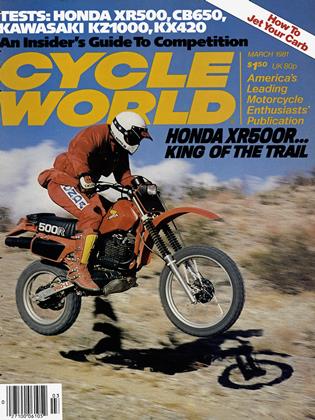A GUIDE TO COMPETITION
What Those Guys Are Doing Out There, Who's Winning...And How To Tell
John Ulrich
When I was in college I had to take a lot of what the school officials called collateral classes: they had nothing to do with my major or what I was interested in, but were required anyway. I signed up for one such class, covering American novels written a long time ago, just because the instructor was beautiful.
It was after several months of plodding through dull (but great! they said) books and listening to the instructor (who was still beautiful but no longer a novelty because of it) drone on and on that my problem developed.
A simple problem.
Staying awake.
Nodding off and catching your head just before it slumps onto the desk makes one feel guilty and watched. What if the professor saw it? Sideways glances, lowered eyes, more listening . . . then another . . . nod off . . .
caughtatthelastminute.
Then one day I discovered the solution. Just by thinking about the first turn at a certain local racetrack where I competed on weekends, I could raise my respiration rate, coat my palms with sweat and stare with wide eyes while the instructor developed an insomniac's dream monologue about boring books and authors.
No matter how many times I tried it, the trick always worked. The thought of rushing off the starting grid with 30 other guys, stuffing it into the turn as bikes slid and tumbled around me—the image, the feeling, the effect never faded.
Doing it. That's what I first loved about racing, but the more I rode in different kinds of events, the more interested I became in watching others do it. Sailing around the banking at Ontario yourself makes it all the more exciting, mindboggling, incredible to watch Wes Cooley do the same thing except without getting off the throttle! as he shatters the lap record on his Yoshimura Superbike.
Sliding around a dirt track, tentatively at first, then with increasing speed, makes it just that much better to watch Jay Springsteen drag the cases as he pitches his Harley-Davidson XR750 into the third turn at the San Jose Mile.
The more I do, the more I appreciate what I can't do—and the more I want to watch Freddie Spencer drift his TZ750 around Turn Four at Daytona or Kenny Roberts slice through Turn Eight at Laguna Seca. To try, to know, is to watch with wonder.
More and more, I am dazzled by the awareness of exactly what those riders out there are actually doing. The knowledge that the man running 20th could lap the good street rider or recreational dirt rider eight times in a 20-lap race. That the level of skills involved and displayed is so high, and that it gets higher with each jump from club to national to international to world championship races.
Racing is addictive, both to watch and to do. And it's diverse and specialized, with many forms to participate in or observe.
This is a competition guide. It doesn't contain everything about all forms of racing. But it does present an idea of what is involved in the most popular forms of motorcycle competition in the United States.
This country is a big place. It would take this entire magazine to try to list every track and race. But there are answers for someone who wants to watch or
try racing, but who doesn't know where the racing is.
Cycle News is a weekly tabloid newspaper devoted to motorcycle racing with two editions, one covering the western half of the U.S., the other covering everything east of the Mississippi River. Each week Cycle News carries an ongoing, updated calendar section listing upcoming races by type and location. The listings contain phone numbers to call for more information.
Many motorcycle shops are also good sources of information about local racing. Going to a shop and asking about races in the area won't always produce the information you want, but then again, often it will.
There's a form of racing for everybody, from adults on 1400cc hillclimbers to little kids on mini-motocrossers. It's out there. It's exciting. It's fun.
Find it. And if you're ever forced to take an English class that you don't want to, you won't have to worry about falling asleep and tumbling out of your chair onto the floor.














